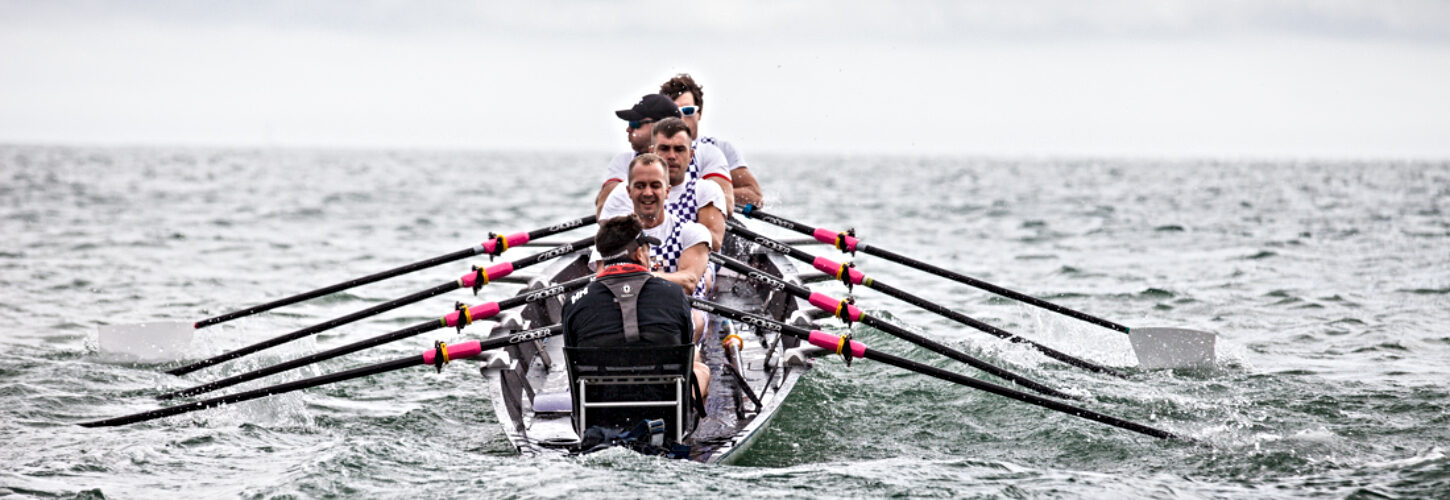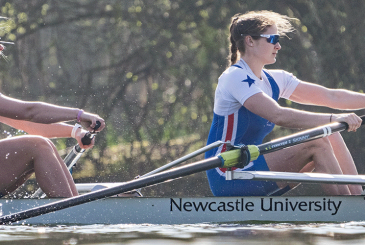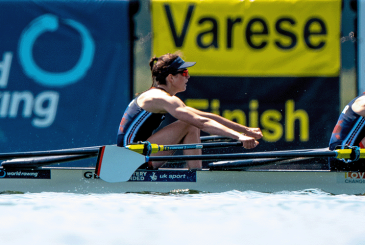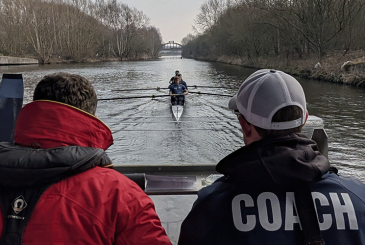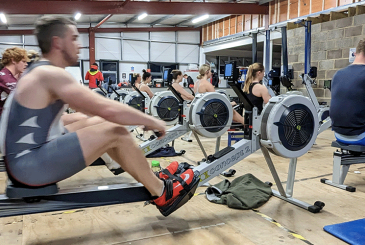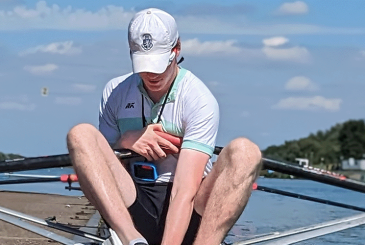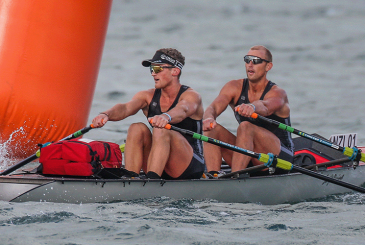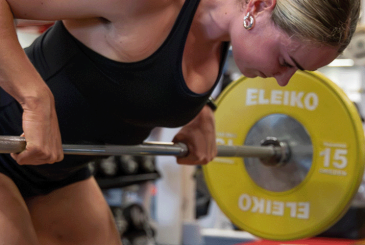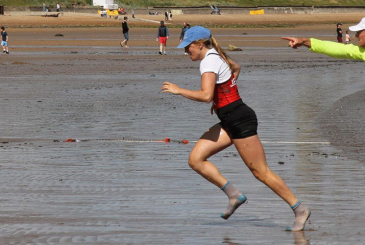Time and tide wait for no one – and with the 2022 World Rowing Coastal Championships and Beach Sprints set to launch out at Saundersfoot later this year, what better time to get up to speed with flat-water’s ‘wilder cousin’. Nick Hartland reports
Rowers from around the globe will be heading to the Pembrokeshire coastal village for the 10-day festival of sea sculling this October, and in late-June, the British Rowing Offshore Championships and Beach Sprint Championships take place in Saundersfoot too.
And with the sport about to surf a giant wave of interest, coaches and club organisers can now get on board with British Rowing’s new ‘Coastal Sculling Award’ – providing the skills and knowledge needed to prepare crews and host offshore and beach events effectively and safely.
Led by World Rowing Coastal Championship competition chief Sam English, the course shares experience and expertise from across the sport, to help you best deliver the fast-growing coastal discipline.
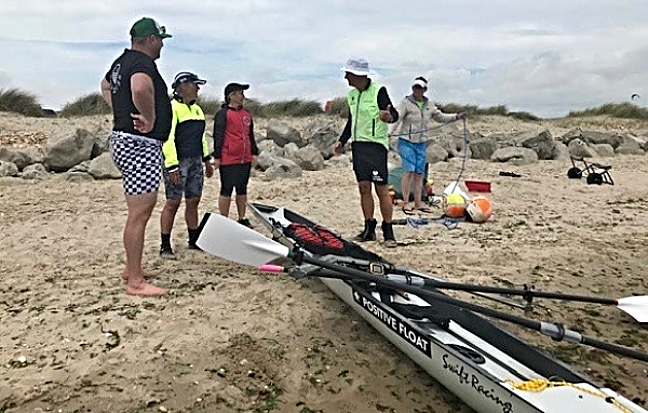
With Beach Sprints also tipped for the 2028 Olympics, Sam says: “It’s a fantastic time to be involved. Coastal is new, exciting and developing, and to be part of that, with the worlds coming to our shores, is thrilling.
“You’ve got niche adrenaline sports like surfing and kiteboarding, but sea rowing is so accessible.
“When I moved to West Wales 10 years ago with my young family, we watched the fixed-seat Celtic longboats launching off the beach from our harbour-side house, and thought we’ve got to try it and were welcomed with open arms.
“It doesn’t matter what shape or age you are, it’s just so much fun going out on the sea in stunning locations with great people, sitting in the bay watching the sun going down, with dolphins jumping around, or battling the waves in a fierce race.”
Sam launched her rowing journey at Aberporth RC, and the self-confessed “organiser” soon found herself on the committee and working with Welsh Rowing.
“To have the coastal worlds on our doorstep – I’ve got butterflies, what an opportunity to grow the sport”
She took British Rowing’s Level 2 course to “broaden her knowledge” and became Welsh Rowing’s Coastal Development Officer to help take sea rowing to the next level, before playing a key role in the worlds bid.
“I love the sea, the beach, and it’s great doing a bit of exercise that’s available to anyone – you get a really good workout, youngest, oldest, small or big, and you’re doing it in a beautiful place immersed in the elements.
“And to have the coastal worlds on our doorstep – I’ve got butterflies, what an opportunity to grow the sport.
“Our bid offered a real festival of rowing in a great part of the world, but given the rival bids and glamorous locations I still couldn’t believe it when we got it.
“I think our team ethos did it, we really got the community, the sports bodies, and the councils on board.
“With all countries switched on to coastal now and looking to compete, we’re hoping for 1,000 offshore rowers and 300 beach sprinters.”
And with the sport making waves worldwide, British Rowing’s ‘Coastal Sculling Award’ comprising four three-hour online ‘theory’ sessions and eight-hours of face-to-face ’practical’ work and assessment can help your club surf to success.
“Through the course, we can all benefit from a mix of people from across the breadth of rowing,” says mum-of-two Sam.
“At the end of the day, we’re all rowers – it doesn’t matter whether coastal or flat-water. The similarities mean we can take advantage of working together across the disciplines – it’s exciting that there can be this sharing of information.
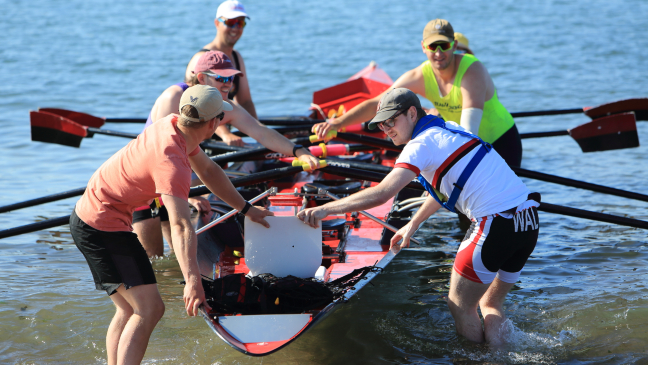
“Key for many from sea rowing is learning about the sliding seat, as much gig and longboat racing is fixed. And up to a mile offshore with waves, tides, wind, safety is important and we’ll help those attending develop the mindset to deal with all the variables.
“Now I have all the tools I need to promote rowing to the thrill-seekers.”
“You’ll develop the confidence and ability to react on your toes and deal with whatever arises, and to go to different locations and take on different conditions, to read them, such as how to deal with the huge waves at last year’s worlds in Portugal.
“You’ll understand the importance of planning and factoring in all the different elements before you row and race, and learn how to prepare race strategies and tactics.”
Having done the course, Lucy Hart of Christchurch Rowing Club says: “Adrenaline, big waves and a sculling boat… there’s so much to love about the sport and all aspects of the award, from safety through to laying out a course and having a go yourself.
“Now I have all the tools I need to promote rowing to the thrill-seekers.”
With rounding buoys and clashing all part of the fun, thinking ahead but reacting fast pays off.
“It’s really tactical,” says Sam. “You want a clean turn, but you have 30 boats bearing down on that first buoy to get round first. You’re moving at speed and you need to know where you are and where the other boats are.
“Are you going to slow down into the buoy and risk clashing, go tight and risk missing it, go wide?
“It’s adrenaline stuff, you’re having to think fast and react on your feet.
“When you’re out there looking back at the shore you just feel so privileged, it’s magical.”
“Coastal’s wilder, more unpredictable – on flat-water you’re training to do something perfect, and there’s a lot to learn from river rowing with its skill sets and blade work. But on the sea, the situation can change every stroke. You need to be reactive, resilient and enjoy the adventure.”
Tim Fenemore of Hollowell Scullers and Positive Float Coastal Rowing is a great fan of the Coastal Sculling Award, saying it “helps define best practice in the coaching of coastal rowing activities, including the much-needed risk management.
“Coasts and estuaries have different hazards to rivers and lakes – this award is essential for coaching and rowing centre teams. It gives us all a common language and approach,” he adds.
And with the tide now running fast behind coastal sculling, Sam says: “It’s new, and everyone’s learning and sharing. River rowers might be surprised by the friendly, supportive atmosphere on the beach, so come and broaden your horizons – it’s wild, spray flying, waves, wind, an amazing buzz.
“When you’re out there looking back at the shore you just feel so privileged, it’s magical.”
Look out for details of the next Coastal Sculling Award course on the British Rowing website and find out more about this area of our sport here.
Photos: Tom Hurley, WEROW


